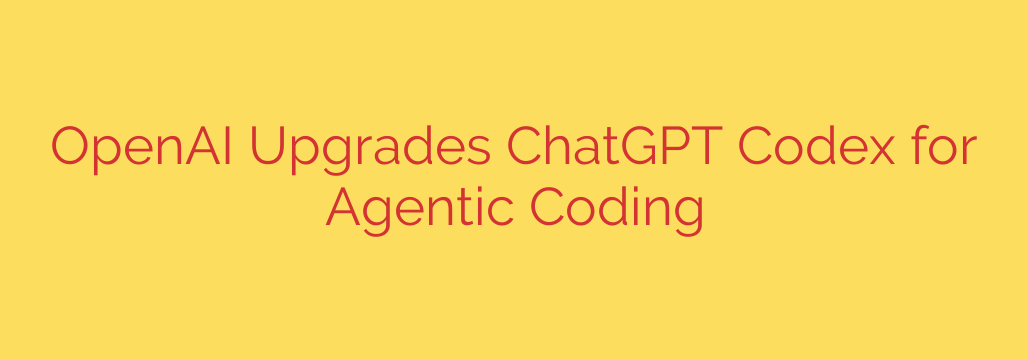
The Next Leap in AI Programming: Understanding the Rise of Agentic Coding
The world of software development is on the brink of another seismic shift. For the past couple of years, developers have grown accustomed to AI-powered code completion tools that suggest lines or entire functions. While incredibly useful, this technology has largely functioned as a sophisticated autocomplete. Now, we are entering a new era: the age of agentic coding.
This latest evolution in AI represents a fundamental change from a passive assistant to an active participant in the development process. Instead of merely suggesting code, these advanced AI systems can now operate as autonomous agents, capable of tackling complex programming tasks from start to finish.
What Exactly is Agentic Coding?
To put it simply, older AI coding models were like having a junior programmer you could ask for help with a specific function. You still had to manage the project, connect the different parts, and fix any bugs that arose.
Agentic coding, on the other hand, refers to an AI system that can autonomously understand a high-level software development goal, break it down into smaller tasks, write the code, test it, and debug it with minimal human intervention. It functions less like a code snippet generator and more like a self-sufficient virtual developer. It can plan a strategy, execute it, and correct its own mistakes along the way.
Key Capabilities of New Agentic AI Models
These new capabilities transform the AI from a simple tool into a powerful collaborator. The most significant advancements are centered around giving the AI agency and the ability to interact with a development environment.
- Multi-Step Task Execution: You can provide a high-level prompt, such as “Build a simple Python web application with a contact form that saves entries to a CSV file.” The AI agent can then create the project structure, write the HTML for the form, develop the Python backend logic, and ensure the two parts work together seamlessly.
- Self-Correction and Autonomous Debugging: This is perhaps the most critical upgrade. Previously, if an AI-generated script had a bug, the human developer was responsible for fixing it. Agentic systems can now execute the code they write, analyze error messages, and iteratively rewrite the code to fix the bugs. This creates a powerful feedback loop that dramatically accelerates development.
- Environment Interaction: A truly groundbreaking feature is the ability for the AI to interact with its coding environment. It’s no longer limited to just outputting text. These agents can create files, read existing codebases, run terminal commands, and execute test suites. This allows the AI to have a full contextual understanding of a project, not just the single file it’s working on.
What This Means for Developers and the Future of Software
The rise of agentic coding does not signal the end of the programmer. Instead, it signals a change in the developer’s role, shifting focus from tedious, boilerplate tasks to high-level architecture and strategic oversight.
- Accelerated Prototyping and Development: The speed at which new applications and features can be built will increase exponentially.
- Democratization of Coding: Complex tasks that once required deep specialized knowledge may become accessible to a broader audience.
- Focus on High-Level Design: Developers will spend less time on routine implementation and more time on system design, user experience, and solving complex business problems.
Essential Security Practices for AI-Driven Development
As with any powerful new technology, agentic AI introduces new challenges, particularly around security. Handing over control of a development environment to an AI requires careful oversight and strict security protocols.
- Human Oversight is Non-Negotiable: Never allow an AI coding agent to operate in a production environment without rigorous human review. Treat all AI-generated code as if it were written by a new junior developer—it must be thoroughly tested and reviewed by a senior team member.
- Beware of Vulnerability Introduction: An AI may inadvertently write code with common security flaws (like SQL injection or cross-site scripting) or use outdated, insecure libraries. Always run AI-generated code through static and dynamic security analysis tools before integrating it into your main codebase.
- Protect Proprietary Information: Be extremely cautious about what information you share in prompts. Avoid pasting sensitive data, API keys, or proprietary algorithms into any AI interface, as this information could be used for model training or be otherwise exposed.
- Sandbox Your Environment: When allowing an AI agent to execute code, ensure it is operating within a sandboxed, isolated environment. This prevents it from accessing or damaging other parts of your system if it malfunctions or is compromised.
Ultimately, agentic coding is a paradigm shift that will empower developers to build more, faster. By embracing this technology while maintaining a strong commitment to security and human oversight, development teams can unlock unprecedented levels of productivity and innovation. The era of the AI co-pilot is evolving into the era of the AI-powered development team.
Source: https://www.bleepingcomputer.com/news/artificial-intelligence/openai-releases-big-upgrade-for-chatgpt-codex-for-agentic-coding/








